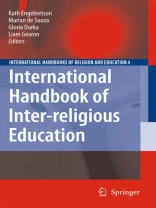This Handbook is based on the conviction of its editors and contributing authors that understanding and acceptance of, as well as collaboration between religions has essential educational value. The development of this Handbook rests on the f- ther assumption that interreligious education has an important role in elucidating the global demand for human rights, justice, and peace. Interreligious education reveals that the creeds and holy books of the world’s religions teach about sp- itual systems that reject violence and the individualistic pursuit of economic and political gain, and call their followers to compassion for every human being. It also seeks to lead students to an awareness that the followers of religions across the world need to be, and to grow in, dialogical relationships of respect and understa- ing. An essential aim of interreligious education is the promotion of understanding and engagement between people of different religions and, therefore, it has great potential to contribute to the common good of the global community. Interreligious education has grown from the interfaith movement, whose beg- ning is usually identi?ed with the World Parliament of Religions held in Chicago in 1893. This was the ?rst time in history that leaders of the eastern and we- ern religions had come together for dialogue, and to consider working together for global unity.
Tabela de Conteúdo
Section one: The philosophical and theoretical aspects of inter-religious education.- Section two: Religious education for inter-religious engagement.- Section three: Inter-religious education for social justice and peace.- Section four: Inter-religious education for citizenship and human rights.- Name Index.- Subject Index.












